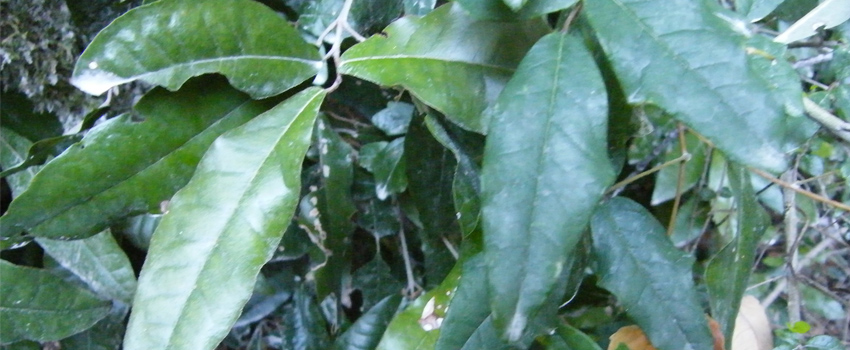
Important international media have already publicized the discovery that, for the first time, shows a plant imitating several ''hosts''.
The vine Boquila trifoliolata, native to the temperate rainforest of Chile and Argentina, is the protagonist of a notable discovery in nature made by the researcher at the University of La Serena, Dr. Ernesto Gianoli Molla.Through research, the scientist verified that the leaves of this climbing plant can imitate the leaves of multiple support trees (hosts) and their mimicry patterns are consistent with a herbivory avoidance hypothesis.
The discovery was made by Dr. Ernesto Gianoli together with his student from the U. de Concepción, Fernando Carrasco Urra. The article was published last week in the journal Current Biology (Elsevier) (http://www.sciencedirect.com/science/article/pii/S0960982214002693) and immediately caught the attention of important international media.
National Geographichttp://phenomena.nationalgeographic.com/2014/04/24/the-most-versatile-impressionist-in-the-forest/) and Science (http://news.sciencemag.org/biology/2014/04/scienceshot-chameleon-vine-discovered-chile) have already announced this discovery that shows the remarkable imitation capacity of this plant, while this week the magazine Nature will join in.
As the biologists point out in their article, mimicry in animals is quite common, while documented cases in plants are rare and the associated benefits rarely elucidated.
In the case of Boquila trifoliolata (family Lardizabalaceae), the imitation of the leaves of its supporting trees is carried out in terms of size, shape, thickness and color of the blade, as well as the orientation and length of the petiole, and even, the appearance of a thorn at the leaf apex.
As the researchers highlight, the case of other plants that have the capacity to mimic another species or its characteristics has previously been reported, but this is the first time that a single individual can imitate multiple and varied hosts.
According to the data obtained by the authors, this ability gives these plants some protection against forest herbivores, such as insects and small snails.
Dr. Ernesto Gianoli and Fernando Carrasco have not yet determined how this plant – which is already beginning to be called in the media ''the chameleon vine'' – can capture the characteristics of its nearby trees. At the moment, it is presumed that it would have the ability to do so by detecting signals hidden in odors or chemicals secreted by hosts, or by means of microbes that can transport activation gene signals between Boquila trifoliolata and the mimic species.
The discovery
As the biologist from the University of La Serena tells National Geographic, the discovery was part of a naturalistic observation walk through the forest, when he decided to take a break from the usual sampling and measurement work that his studies of forest plants entail. temperate climates of Chile.
At that time, Dr. Ernesto Gianoli discovered the strange capacity of Boquila trifoliolata, which grew in the sector exhibiting very different leaves, while similar to its nearby plants and trees.
Thus Fernando Carrasco's undergraduate thesis project was born and the research began that made it possible to verify the extraordinary capabilities of the aforementioned vine, in which they were even able to show that the leaves of Boquila can vary up to 10 times the size of their leaves and from very light to very dark their color.
The relevance of this finding, which in the words of Ernesto Gianoli "can lead us to understand a new way by which the phenotype of plants is controlled", has led the authors of the main biology textbook in English (Campbell ) contact you to give special coverage to the case in the next edition of the book.

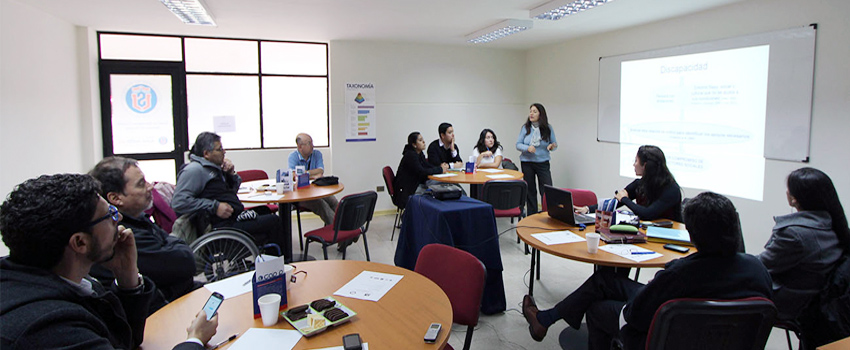
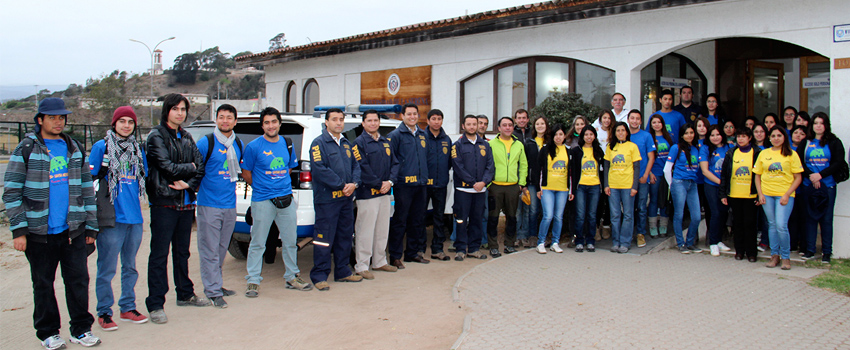
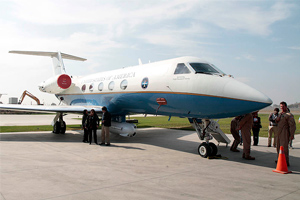 It is expected that through the use of satellite information it will be possible to increase yield and quality related to key parameters such as: yield per hectare, sugar content and bunch density. "All of the above can be achieved through the information generated by maps, which will make it possible to adopt an efficient irrigation strategy, knowing when and how much water to use," said Maureira, who maintained that the model could also be expanded to other crops or natural plant covers of our region, currently exposed to a long period of drought.
It is expected that through the use of satellite information it will be possible to increase yield and quality related to key parameters such as: yield per hectare, sugar content and bunch density. "All of the above can be achieved through the information generated by maps, which will make it possible to adopt an efficient irrigation strategy, knowing when and how much water to use," said Maureira, who maintained that the model could also be expanded to other crops or natural plant covers of our region, currently exposed to a long period of drought.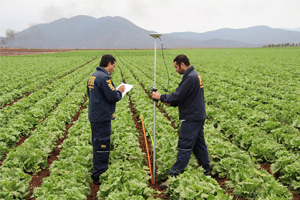 The field work had the collaboration of these institutions and the University of Chile - Ceza Arid Zones Study Center, the Ministry of Public Works, Agrícola Callegari Ltda., Agrícola La Alpina Ltda., Viña Tabalí SA and Viña Tamaya SA In addition, This mission was sponsored by the Compañía Minera del Pacífico.
The field work had the collaboration of these institutions and the University of Chile - Ceza Arid Zones Study Center, the Ministry of Public Works, Agrícola Callegari Ltda., Agrícola La Alpina Ltda., Viña Tabalí SA and Viña Tamaya SA In addition, This mission was sponsored by the Compañía Minera del Pacífico. 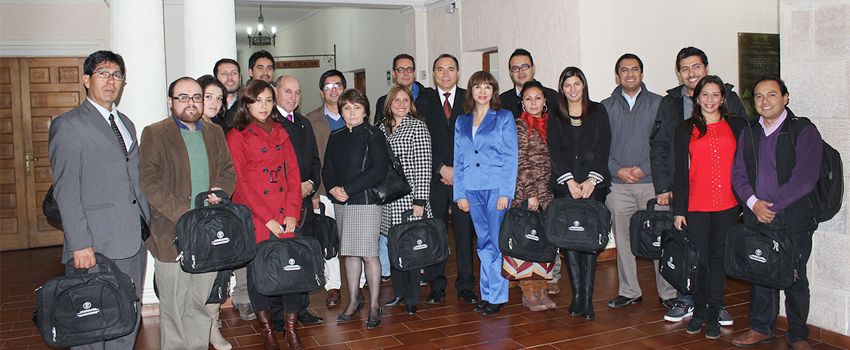
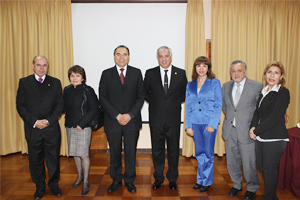 Dr. Rojas added that ''for us this process has been very important, this is the fifth generation of students who have entered and we have important challenges such as the accreditation of the program and the opportunity to teach it in Argentina at the National University of San Juan . We are happy, we have made notable progress with the graduates, which shows us that we are on the right path, given that the people who have entered have been climbing in their professional lives, that is important because it shows that from this Master's degree onwards they They manage to differentiate themselves.
Dr. Rojas added that ''for us this process has been very important, this is the fifth generation of students who have entered and we have important challenges such as the accreditation of the program and the opportunity to teach it in Argentina at the National University of San Juan . We are happy, we have made notable progress with the graduates, which shows us that we are on the right path, given that the people who have entered have been climbing in their professional lives, that is important because it shows that from this Master's degree onwards they They manage to differentiate themselves.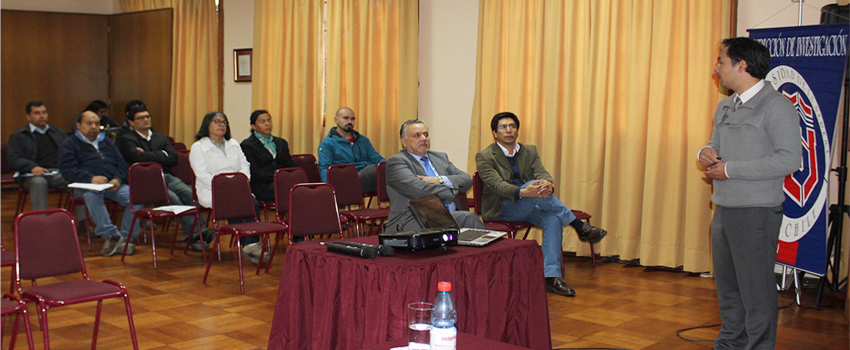
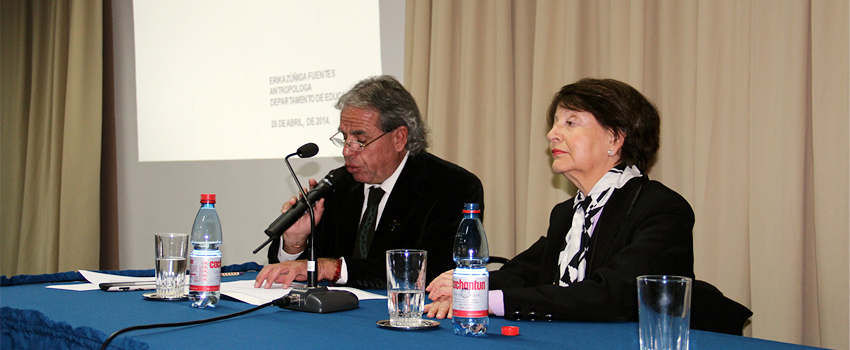
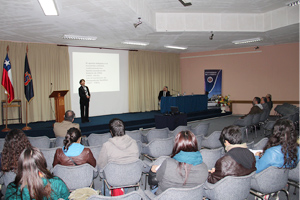 With the purpose of contributing to this task whose main expression is constituted by dozens of theses, scientific articles, research projects, Logos magazine, dozens of prestigious visiting professors, talented candidates, among others, the anthropologist and academic from the Department of Education of the ULS, Dr. Érika Zúñiga, gave the Inaugural Class: ''The Native Peoples in the Educational Stories of the Nation'', thesis work of her Doctorate in which she addressed the indigenous contribution to the colonial economy, confronting the school texts of History of Chile (1845-2012), with the testimony of Hernando de Santillán (1557-1561). As the teacher commented, the study sought to demonstrate the existence in school textbooks of the prejudice that the indigenous people in Chile would not present the conditions to adapt to the colonizing economy, their ''laziness'' appearing strongly associated with this. In the work, the school text was conceived as a cultural tool of the republican State to promote the national ethos, the analysis focused on the economic role of the indigenous as a counterweight to the warlike image of the Conquest and sought to observe the origin, development and persistence of negative stereotypes about indigenous people.
With the purpose of contributing to this task whose main expression is constituted by dozens of theses, scientific articles, research projects, Logos magazine, dozens of prestigious visiting professors, talented candidates, among others, the anthropologist and academic from the Department of Education of the ULS, Dr. Érika Zúñiga, gave the Inaugural Class: ''The Native Peoples in the Educational Stories of the Nation'', thesis work of her Doctorate in which she addressed the indigenous contribution to the colonial economy, confronting the school texts of History of Chile (1845-2012), with the testimony of Hernando de Santillán (1557-1561). As the teacher commented, the study sought to demonstrate the existence in school textbooks of the prejudice that the indigenous people in Chile would not present the conditions to adapt to the colonizing economy, their ''laziness'' appearing strongly associated with this. In the work, the school text was conceived as a cultural tool of the republican State to promote the national ethos, the analysis focused on the economic role of the indigenous as a counterweight to the warlike image of the Conquest and sought to observe the origin, development and persistence of negative stereotypes about indigenous people.